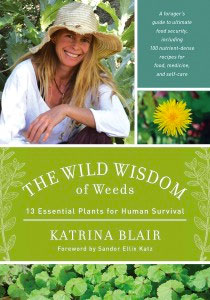The Wild Wisdom of Weeds: 13 essential plants for human survival

Call her the wild weed whisperer of the West.
Katrina Blair exhibits a strong spiritual connection to the earth exemplified not only in how she spoke with us on-camera, but in the writings of her first book: The Wild Wisdom of Weeds: 13 Essential Plants for Human Survival— the basis for the interview.
As Blair explains in the video, the 13 wild weeds were chosen because of their ubiquity throughout the world, their degree of heartiness, and their high nutritional value as food and for medicinal purposes.
These are the 13 wild weeds profiled in her book:
- Amaranth (Family: Amaranthaceae)
- Chickweed (Family: Caryophyllaceae)
- Clover (Family: Fabaceae)
- Dandelion (Family: Asteraceae)
- Dock (Family: Polygonaceae)
- Grass (Family: Poaceae)
- Knotweed (Family: Polygonaceae)
- Lambsquarter (Family: Chenopodaceae)
- Mallow (Family: Malvacea)
- Mustard (Family: Brassicaceae)
- Plantain (Family: Plantagonaceae)
- Purslane (Family: Portulacaceae)
- Thistle (Family: Asteraceae)
Katrina Blair offers inspiration toward a more holistic view of life where nature takes center stage. There’s a closer connection with the journalist Jo Robinson whose book,Eating on the Wild Side, advances the controversial claim that wild foods contain higher nutritional value than their cultivated counterparts. Listening to Blair there are also shades of Claire Hope Cummings in her book Uncertain Peril: Genetic Engineering and the Future of Seeds, talking about the inherent generosity of nature. In Wes Jackson, whose life at the Land Institute is the quest to develop perennial strains of wheat and other crops that more closely mimic nature. And, Vandana Shiva, the physicist turned organic farmer and activist who argues against monocrops and pesticides and tells us that farmers live off the plants that industrial farming seeks to eradicate as weeds. But above all, in Blair, there’s a constant reminder of food being primarily for purposes of enjoyment and nutrition as opposed to commercial yield and economic gain.
The Wild Wisdom of Weeds provides a practical guide for understanding how to identify and use key wild plants as food and for medicinal uses. Blair articulates her view that our ability to understand and place value on the bounty that nature offers is critically important to ensure our future survival. In addition to numerous color photographs and drawing illustrations, the book contains her recipes for making various dishes and treats from the 13 wild weeds that are presented.
As a side note, Blair owns a wild weed cafe in Durango, Colorado where all the ingredients for a four course meal are sourced locally. True to her nature, the fresh foods are provided to customers without a set price, patrons are asked to make a donation for their meals.
Most of the videos featured on Cooking Up a Story were produced, filmed, and edited by Rebecca Gerendasy. Fred Gerendasy contributed as a writer to many of the posts and occasionally as the interviewer. Visit Rebecca Gerendasy Clay – Art and Fred Gerendasy Photography to see their current work.
